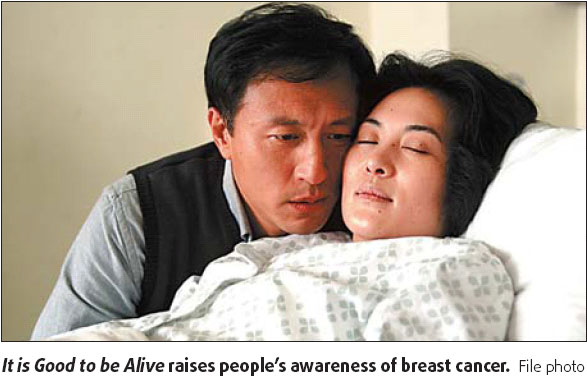True tragedies that inspired new TV drama

If 10,000 women saw a TV series, and half of them went for a mammogram, at least 15,000 people, including the women's families, would benefit.
So says director Guan Hu of his latest TV drama, It is Good to be Alive (Huozhe Zhenhao). As the first Chinese TV series spotlighting breast cancer, the 44-episode drama will premiere during prime time on CCTV-8 since February 29.
Guan already had the idea of creating such a series when a longtime friend's wife was diagnosed with breast cancer. Upon seeing the shock and trauma the family faced first-hand, Guan immediately began working on the script with writer Zhao Dongling.
The plot revolves around a large family with the medical history of breast cancer, and one character's story was adapted from the real-life experience of Guan's friend.
"The show's foremost objective is to raise awareness about the disease among viewers and to urge them to care for their health before it is too late," Guan says.
Recent figures show that 200,000 of China's 630 million women are diagnosed with the disease annually, says Xu Guangwei, honorary director of the Chinese Anti-Cancer Association. And 40,000 among those diagnosed die from it every year.
A concerning medical trend is that the patients are becoming younger and younger. The disease garnered public attention last year when it claimed the life of Chen Xiaoxu, the actress well known for her portrayal of Lin Daiyu, a main character in Chinese classical novel A Dream of the Red Mansion (Honglou Meng).
Guan researched articles and documentaries about the disease, which he introduced to the crew, in addition to inviting those suffering from the cancer to share their feelings with the actors.
"I never felt breast cancer was so close to me before I joined the project," says Guan's wife Liang Jing, who plays the youngest daughter in the series. After reading the script, Liang and most other female crewmembers took a physical together.
Viewers see many scenes set in wards and operation rooms, because two-thirds of the series was shot in a hospital in Southwest China's Chongqing municipality.
The crew says they were impressed with the courage and passion of the hospital's doctors and patients.
"Many patients volunteered to help," Liang says. "They weren't even afraid of showing their wounds for the cameras, because they said they hoped more women would learn from their experiences and cherish their health."
Some of these patients ended up taking roles in the show, while many of the hospital's doctors provided consulting to the crew.
Liang says she both appreciates the courage of the patients and feels sorry for them.
"In my view, the shape of a woman's body is the most beautiful thing," she says. "So when it is severely damaged, even though it's covered with clothes, many women still feel incomplete and struggle to face themselves, their loves and their families; this is what we want to explore."
In the drama, the onset of breast cancer comes along with doubt, hatred and hurt among many families. While the disease upsets the peaceful lives of the family members, through love and strong will, they persevere to find happiness.
"The story is not only for women but also for men," Guan explains. "What is the right attitude for men, as lovers or husbands, to have before the disease? I hope that through this story people would come to think about it."
Guan's own attitude is perhaps best shown by a line used in the opening of the drama: "For My Mother". His wife Liang says the director was also paying tribute to all the women who are mothers, daughters, sisters and wives.
In 2003, China joined the Pink Ribbon campaign, part of the global supportive community raising awareness about the disease and working for prevention and a cure. Since then, new progress has been made, such as the Breast Cancer Prevention Fund launched by the China Association of Social Workers last month.
(China Daily 02/26/2008 page19)














